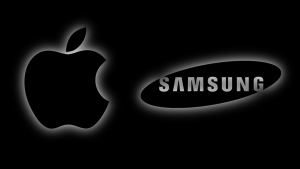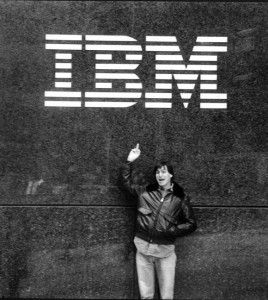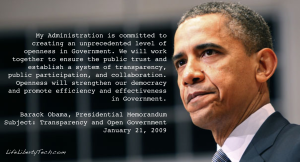It’s hard to put into words my emotions right now. I feel like I’ve been punched in the gut (and having trained in martial arts, I know exactly how that feels). To me the Internet is the the greatest tool for freedom mankind has ever known and one of the greatest entrepreneurial engines in history. Now the censorship arm of the federal government, the FCC, has hijacked control of the Internet – ironically under the guise of “Net Neutrality.” I find it hard to fathom how giving control of the Internet to an agency tasked with restricting the free flow of information is a good idea. I doubt many others do either. However as I wrote before, I believe the FCC, seemingly at the behest of President Obama, has deftly pulled off a political maneuver to give themselves control of the Internet. It is not exaggeration to say that this may be the biggest government slight of hand in history. Make no mistake, government has pulled the rug out from underneath our freedom, and many who believe they are protecting the Internet are cheering this development.
I honestly have so many thoughts going through my head that I struggle to put them all down. So let me just write down some various observations and questions:
- When the FCC proposed different rules last year, they allowed an extended period of public comment. This year we did not get a chance to comment. In fact the new proposal was created and voted on in less than a month. Why the rush with this set of rules?
- FCC Chairman Tom Wheeler claims that the comments from last year are sufficient for this new set of rules. However, this set of rules is so different from last year’s proposal that it is hard to accept that argument.
- Not that the public really got a chance to understand this year’s proposal. The proposal was kept hidden from the public until after the vote was taken. Tom Wheeler steadfastly refused to reveal the proposal, even after congressional requests. Why the secrecy?
- This year’s “Net Neutrality” rules are almost a complete reversal from what the FCC proposed last year.
- The FCC’s actions are unprecedented in scope. For something so important, I would think that a poll consisting of only 3 yes votes is not sufficient.
- How is it that a commissioner appointed by Obama could originally suggest rules that were almost in complete opposition to what Obama later called for? Then so easily flip-flop?
- Just because one calls a set of rules “Net Neutrality” doesn’t make them so. Especially when the same label was given to a previous set of rules that is almost completely the opposite of what is being proposed now.
- There was no threat to Net Neutrality last year. The only threat was from the FCCs’ proposed rules.
- I doubt that most people who support Net Neutrality fully support an FCC takeover. Especially if they were given time to understand all the ramifications. Which I guess is why these new rules were rushed to vote.
- Nearly everything about this situation stinks. I mean really, really stinks.
- If the danger of a big government bureaucracy isn’t evident now, it should be. IT TOOK ONLY 3 PEOPLE VOTING YES TO USURP THE MOST IMPORTANT TECHNOLOGY ADVANCEMENT IN HISTORY!
- Ok, forget 3 people, this appears to be basically an executive order from Obama.
- Give the importance of the Internet to our future freedom, this feels like a Coup d’état.
How to get the public to accept government control of the Internet in three easy steps:
- Use the FCC to propose a set of rules that puts the public into a hysteria about “Net Neutrality.”
- Suggest that the only way to protect “Net Neutrality” is for the FCC to take full regulatory control of the Internet.
- Have the FCC propose a new set of rules that ostensibly protects “Net Neutrality” while giving full regulatory control of the Internet and rush the rules to vote, not allowing the public to scrutinize the rules or comment on them.
At this point I am resolved to fight this tooth-and-nail. This was just the first battle. The war for control of the Internet and our freedom has just begun.
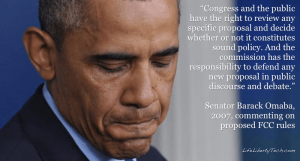
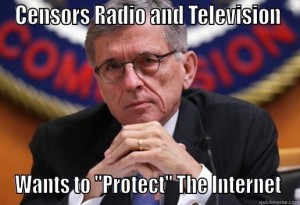
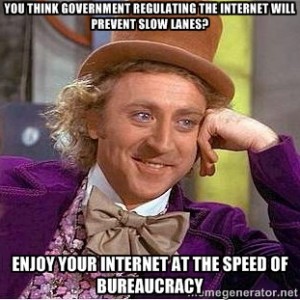
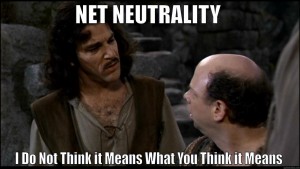

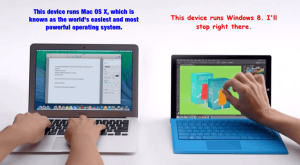
 I’d like to share some thoughts on ideas from an article I read recently (and unfortunately can’t locate at the moment).
I’d like to share some thoughts on ideas from an article I read recently (and unfortunately can’t locate at the moment).